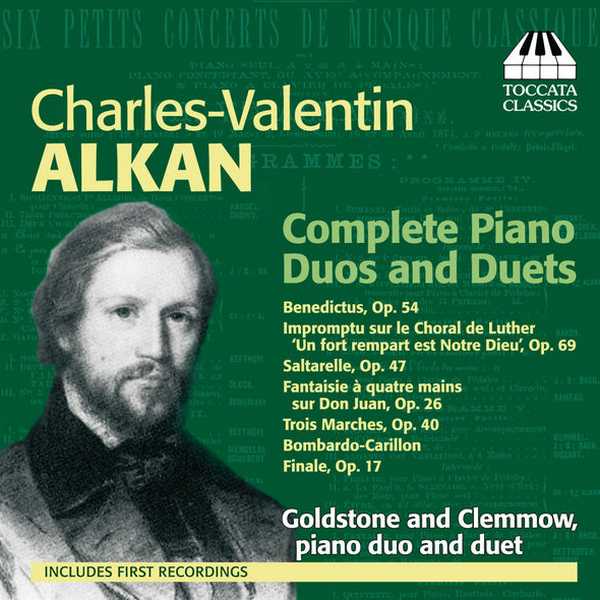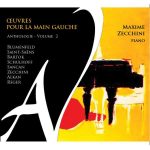
Composer: Charles-Valentin Alkan
Performer: Goldstone and Clemmow
Format: FLAC (tracks)
Label: Toccata
Catalogue: TOCC0070
Release: 2011
Size: 245 MB
Recovery: +3%
Scan: yes
01. Benedictus, Op. 54 (arr. R. Smalley)
Impromptu sur le choral de Luther, Op. 69 (arr. R. Smalley)
02. I. quarter note = 63
03. II. L’istesso tempo: quarter note = 63
04. III. L’istesso tempo: quarter note = 63
05. IV. L’istesso tempo: quarter note = 63
06. Saltarelle, Op. 23
Variations-fantaisie on themes from Mozart: Don Giovanni, Op. 26
07. Introduction
08. Theme: Venite pur avanti
09. Variation 1
10. Variation 2
11. Variation 3
12. Variation 4
13. Variation 5
14. Finale: Finch’ han dal vino
3 Marches, Op. 40
15. No. 1 in A flat major: Allegro
16. No. 2 in C minor – E flat major: Allegro moderato
17. No. 3 in B flat major: Moderement
18. Bombardo-Carillon
19. Finale, Op. 17
Charles-Valentin Alkan (1813–88) was one of the greatest virtuosos that ever lived – he became a student at the Paris Conservatoire at the age of six, made his public debut (on violin) the following year, and gained the first prize of the Conservatoire for piano at the age of ten, giving his first public piano recital just two years later.
He was a close friend (and next-door neighbour) of Chopin and George Sand, and often shared the platform with Chopin as well as Sigismund Thalberg and Franz Liszt.
It was around the time of Chopin’s death that he began to devote himself to composition and effectively withdrew from public life, acquiring a reputation as a misanthropic recluse.
The circumstances of his death are obscure, although the traditional account that he was crushed by a falling bookcase while reaching for a volume of the Talmud was probably invented by his son.
As a composer, Busoni considered him to stand on a par with Liszt, Chopin, Schumann and Brahms as one of the five greatest composers for the piano since Beethoven.
His works for piano are among the most demanding ever written – but they can also gleam with a fierce joy and twinkle with mischievous humour, so it’s hardly surprising to find his works for piano duet bubbling with freewheeling energy. The two works for pedal piano, transcribed here for two pianos by Roger Smalley, show a more solemn side to this devoutly religious composer, though they, too, have their own charge of Alkan’s trademark eccentric originality.



